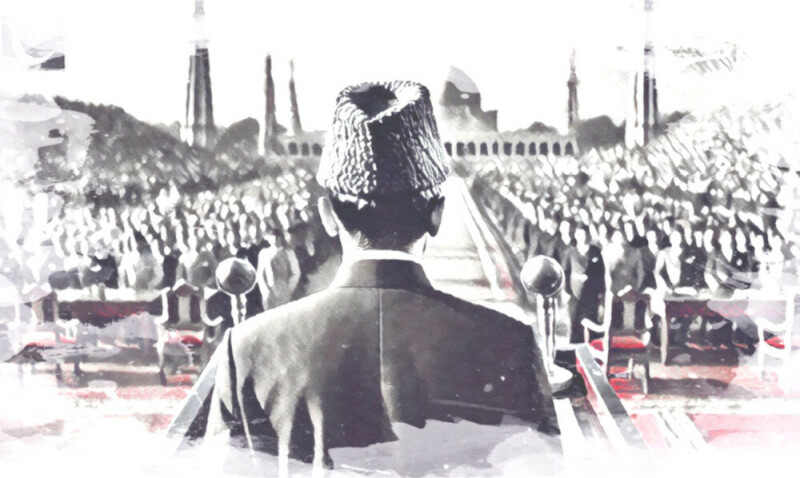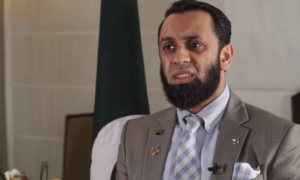The Quaid was clearer about the rule of law in 1918 than many that took oath under his portrait in 2024.
It’s a fickle thing, the public memory — in what it chooses to remember, and what it wishes to forget. It’s worse still on days like these, where everyone invokes the founder’s name and cites his message without actually understanding it, or what he stood for. After all, the act of forgetting is a statement of its own.
Because Muhammad Ali Jinnah is a problem for today’s Pakistan. He’s too liberal for the right, too nationalist for the left, too civilian for the generals, and too much of a merit hire for the dynasts. Wouldn’t it be best, then, to leave the gent on a pedestal that’s too high to reach?
But if the founder remains confined to portraits and postage stamps, it’s come with a cost: our now perma-crisis is the logical outcome of shirking his ideas for years. It’s also why a core aspect of his life has been suppressed so well: Jinnah as parliamentarian.
Enter the Rowlatt Act
The Quaid ranked among the greatest lawmakers of his generation; in a land that increasingly sees the law as a force for coercion, that fact has faded from view. But reading Jinnah in today’s Pakistan — amid the 26th amendment as well as military trials of civilians — is no less than instructive.
For our purposes, we’ll revisit one of the earliest and most powerful speeches of his career: on the right to fair trial and due process in 1919. As the chaos of the first World War died down, India hoped for its liberties to be restored. What it got was the opposite: the all-out repression of the Rowlatt Act — emergency trials and arrests without cause.
In making their case, the British raged about low conviction rates in ordinary courts, how it was impossible to cope with agitations ‘under the normal law’, and how the protesters’ aim was to promote an uprising against the government.
The forces of anarchy were allowed ‘unrestricted license to prosecute their designs’, said crusty Home Member Sir William Vincent.
Up against such colonisers was Jinnah in the Imperial Legislative Council at Delhi. As India convulsed with protests, Jinnah said on September 23, 1918, “Surely it cannot be said that all of a sudden these men became regular criminals. The cause is this, my Lord, that there is discontent; there is dissatisfaction; there is unrest. Might I say, my Lord, that it is partly, if not wholly, due to your policy.”
Yes, India was aflame with riots, but the problem was born of an unfeeling regime and lack of representation — and the Rowlatt Bill “was a wrong remedy for the disease”.
Said the Quaid, “Instead of giving the powers to the executive, I would rather that the power was given to the judiciary, and I would rather even that these offences be tried in a summary way by judicial tribunals, because in my opinion, it is a lesser evil than the executive.”
A stark warning
Well over a century ago, Jinnah was against displacing the judges for the state. More the pity that our members so recently saw fit to pass the horror show of the 26th amendment — the Quaid was clearer about the rule of law in 1918 than many that took oath under his portrait in 2024.
Which brings us to his main address on February 6, 1919 — what editors Malik Mohammad Jafar and I A Rehman would call one of the most glorious chapters of his long career.
“My Lord, to any man who believes in law and justice, these measures seem abhorrent and shocking … my first ground [for opposition] is this, that it is against the fundamental principles of law and justice, namely, that no man should lose his liberty or be deprived of his liberty without a judicial trial in accordance with the accepted rules of evidence and procedure.”
A forensic takedown followed: “… My third ground is that the powers which are going to be assumed by the executive, which means substitution of executive for judiciary, such powers are likely to be abused … Fourth … there is no precedent or parallel that I know of, in any other civilised country, where you have laws of this character enacted.”
And to what end? “… You may be able to get hold of more real offenders but … at the cost of many other innocent men who will be persecuted and who will have no chance, no opportunity, of a proper trial.”
Ultimately, if such a brutal law were passed, “you will create in this country, from one end to the other, a discontent and agitation, the like of which you have not witnessed, and it will have, believe me, a most disastrous effect upon the good relations that existed between the government and the people.”
Jinnah came to the crux: “I am a firm believer that no man’s liberty should be taken away for a single minute without a proper judicial inquiry.”
To be clear, this wasn’t some soapbox speech. When his warnings went unheeded, and Lord Chelmsford, India’s governor-general, pushed the emergency bill through, Jinnah stayed true to himself — he resigned from parliament as soon as the vote was announced in March 1919.
He would write to Chelmsford, “The constitutional rights of the people have been violated at a time when there is no real danger to the state, by an overfretful and incompetent bureaucracy which is neither responsible to the people nor in touch with real public opinion.”
Jinnah continued, “I can be of no use to my people in the Council, nor consistently with one’s self-respect is cooperation possible with such a government … a government that passes or sanctions such a law in times of peace forfeits its claim to be called a civilised government.”
Applying the Quaid’s principles today
All this would be helpful to reflect on today: the founder’s views on liberty, on judicial trials as a right, on not replacing judges with the executive, on civil unrest as a political problem. Not least, he underscored his words with action — quitting a parliament that passed ugly bills via non-representatives (the Indian members were unanimously opposed to the Rowlatt Act).
Interestingly enough, Mr Jinnah’s 1919 speech would be revived almost a hundred years later in 2015 — in District Bar Association, Rawalpindi vs Federation, the Supreme Court would allow military courts to try terrorists.
In the minority were two future chief justices, Jawwad S Khawaja and Qazi Faez Isa. Siding with Justice Khawaja’s dissent (“… I am in complete agreement with his opinion“), Justice Isa cited Jinnah’s 1919 address to hold, “The Constitution does not permit trials of civilians by the military as it would contravene fundamental rights …”
But when military trials of civilians returned in 2023, it would be the retired Justice Jawwad S Khawaja, who fulfilled the spirit of the Quaid’s speech — challenging the trials before the Supreme Court. By contrast, when the same case was fixed, Justice Isa, still serving, stormed off the bench and refused to hear the matter.
As it turns out, Pakistan’s founding ideals have to be fought for every single day. Or, as the Quaid summed up back then, “My Lord, it is no use shirking the issue, it is no use hedging round the whole of this question.”
For a brief moment in time, the Supreme Court’s five-member bench had answered that question with courage — striking down the very provision that allowed for civilians to be court-martialed.
Not that this lasted: the judgment has since been suspended in appeal. Yet whatever the new ‘constitutional bench’ may decide, one fact is imperishable: the original verdict remains true to the Quaid’s address. May he be heard more often.
Header image created with generative AI







